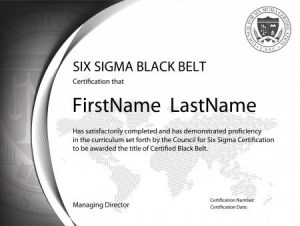Maintaining Your Six Sigma Black Belt
The Six Sigma Black Belt Certification is one of the most respected and valued qualifications in the business world. It’s also one of the most challenging certifications to earn. Are you considering investing time, money, and effort to become a certified Six Sigma Black Belt (SSBB) professional? It sounds like a good plan, but you may wonder if it will expire in a few years and what it takes to renew or maintain it. Unfortunately, the answer to that question isn’t simple. This article will discuss maintaining your SSBB certification.
Renewal and Expiration for Six Sigma Black Belt Certification
Perhaps you’ve already earned your SSBB and are now plotting how you’ll continue to use the methodology’s many valuable insights in your work. Or maybe you are curious about the requirements for maintaining or recertifying your SSBB before deciding if it’s the right path for you. Whatever the case may be, the following are answers to frequently asked questions about SSBB maintenance.

Does the Six Sigma Black Belt Certification Expire?
The answer to this question depends on where you earned your SSBB certification from. Some certificates are valid for life, while other programs put an expiration date on their certifications.
For example, you won’t have to recertify or pay anything more to keep your CSSC SSBB certification active. However, some certifying agencies have a time restriction for the belt’s validity. For example, IASSC accepts certificates as “Current” for three years. This organization mandates a set of rules and guidelines for keeping the belt certified and current. ASQ recognizes SSBB qualification for three years and has a recertification program. ASQ (and other certifying organizations) provide the processes required to recertify as an SSBB on their websites. Most of the time, certifications and recertifications cost money. However, most SSBB certifications do not become invalid with time.
If you don’t want to be held back by a looming renewal deadline for certificates that don’t need regular maintenance, you may prefer to maintain your professional standing with a Six Sigma accreditation that will never expire. Ensure that you look into this before you start any program to become a certified SSBB.
It benefits individuals and companies when certifications don’t need to be renewed. Here are a few reasons why:
- Recertifying an SSBB can be costly to the businesses or individuals who pay for them.
- Some companies use recertification requirements as a method to collect renewal fees and maximize their earnings.
- By having clear guidelines for the renewal procedure, the certification is made available to those who would not have had the chance to study Six Sigma otherwise.
- Making the SSBB certification more accessible by not requiring recertification would enable more individuals to understand how to utilize this powerful tool and enhance business processes.
- Certifications that don’t require recertification promote the spread of Six Sigma, which may assist individuals and businesses alike to advance their careers and build more effective ways for process improvement.
Is there anything else I need to do to maintain my SSBB?
After you have completed the necessary training and earned your SSBB certification, what can you do to maintain it? Is it even necessary if recertification is not required? Even without needing recertification, you should commit to furthering your study and improving your knowledge of Six Sigma principles. This will allow you to stay up to date, polish your abilities in critical business areas, and achieve a deeper level of knowledge within the Six Sigma methodology.
Continuing your education in Six Sigma is one option available to you. You could further your Six Sigma journey by obtaining a Master Black Belt Certification, the highest Belt Level in Six Sigma methodology. In addition, you could take on projects in specific industries to further specialize your skills as an SSBB professional. Another option is to get a degree or certification in project management, business analysis, or organizational leadership by completing courses in these and other related fields that complement Six Sigma training.
Even while continuing education is usually not required to keep your SSBB certification current, the new skills and qualifications you get from furthering your knowledge and studies will be beneficial not just to your organization but also to your career in general.
Summary
If you are thinking about becoming certified as an SSBB, one essential consideration you should make when choosing a program to invest in is how the belt level is maintained. In order to keep your SSBB, many programs require fees or additional study. Other programs bolster certificates that do not have expiry dates, which has several benefits. Keep in mind that even if you choose to get certified from a program that doesn’t need renewing, it’s beneficial to continue learning about Six Sigma to develop and grow your knowledge and be more successful in your career.



